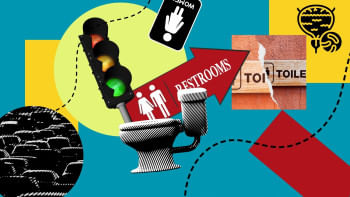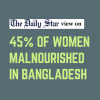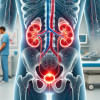Clean toilets: A ‘luxury’ Dhaka’s vulnerable cannot afford

Dotted with modern infrastructures and shopping malls, the capital city of Dhaka is a happening place, and for many, it does not fail to provide "metropolitan privileges." Yet, beneath this veneer of urban sophistication lies a crisis that affects millions daily – one that we would rather not talk about, but can no longer ignore.
For Munia Tanjim, an undergraduate student studying at Chattogram, the ride to the city has been an unpleasant one. She had a tough time finding a decent public toilet, especially after landing in Dhaka. "It was a horror for me," she recalled, her face contorting at the memory. Like many others, Munia, who travels to Dhaka five to six times a year, has developed a dangerous coping mechanism – avoiding hydrating before her journey. The nauseating stench of ammonia and unbearable sight inside train toilets have made it almost impossible for her to use facilities during her commute, let alone after landing at the Kamalapur train station.
One sunny afternoon, Mallik Nupur found herself in a similar predicament. Having travelled all the way from Barishal to Dhaka for a written job exam scheduled at Eden College, she faced a challenge that no job seeker should have to endure. As the exam concluded and relief should have set in, anxiety took its place. The pressing need for freshening up led her on an uncomfortable search through the Dhaka University area for a basic human necessity – a usable toilet.
"I came to Dhaka from Barishal for a written job exam," Nupur recounted, her voice tinged with frustration. "My exam centre was at Eden College. After my exam, I came to the DU area in search of a toilet and only found it at the TSC which was open to public. The stench was so nauseating that I had to keep a scarf wrapping my nose throughout the time and even the door knob was defunct. There were only three toilets and all of them lacked cleanliness."
Besides the crowded points of educational institutions, the situation at commercial hubs paints an equally grim picture. At New Market, down a narrow alley, stands a solitary female toilet – a facility that fails to meet even the most basic standards of hygiene. Surma Begum, who has been working at a shop there for over 10 years, shares a daily struggle familiar to many working women. "I use the toilet only once a day and try to hold my urine till I reach home. It gets very difficult on menstrual days, no way to change napkins in that unclean toilet."
The health implications of this crisis are not just about a few Dhaka residents, rather millions of females echo the same sentiment – where each story feels personal and devastating. During my university days, I often suffered from UTI due to using unhygienic public toilets. The situation deteriorated to such an extent that one instance, while menstruating, using a public toilet on campus led to severe bacterial infections requiring hospitalisation. This is not an isolated incident, but rather a common reality for countless female students and professionals who must choose between using unsanitary facilities or risking their health by holding it in.
Even the public toilets in the busiest areas of our city – Farmgate, Gulistan, Sadarghat, or Kamalapur, where hundreds of people flow in and out every day – are barely usable. One would choose to use one of these public washrooms only in the most desperate situations. It's a choice between two evils: risk your health or endure the discomfort.
Even our healthcare facilities, where hygiene should be paramount, present a disturbing picture. Earlier in June this year, according to a report by ICDDR,B, poor hygiene conditions were found in both public and private hospitals in Dhaka. The study, conducted across 12 public and private hospitals in the capital, revealed alarming statistics. In public hospitals, only 68 percent of toilets were functional, with a mere 33 percent meeting basic cleanliness standards. Private hospitals fared somewhat better with 92 percent functionality and 56 percent cleanliness rates, but still fall far short of acceptable standards.
The study, published in PLOS ONE, evaluated 2,459 toilets and found critical gaps in accessibility and hygiene. In outpatient facilities, the user-to-toilet ratio was staggering: one toilet for every 214 users in government hospitals and 94 users in private hospitals – far exceeding WaterAid's recommended standards of one toilet per 20-25 patients. The situation in inpatient facilities fails to meet Bangladesh's national WASH standards, with 17 users per toilet in government hospitals and 19 in private facilities.
Perhaps most concerning is that less than one percent of these toilets had facilities for disabled people, and only three percent provided proper disposal bins for menstrual products. The picture only gets grimmer when you realise that the actual sanitation conditions in Dhaka hospitals may be worse than what the study found– as the study was conducted in the aftermath of the Covid pandemic when many hospitals were shifting from mainly treating Covid patients to general medical care.
For the marginalised communities, this crisis cuts deeper. They bear the brunt of insufficient hygienic public toilets, and their inability to afford proper medical treatment makes them most vulnerable to the resulting health issues.
The health implications are severe and far-reaching. Using unhygienic toilets can lead to various infections and diseases, as they become breeding grounds for bacteria. Users risk contracting diseases ranging from diarrhoea and intestinal inflammation to hepatitis A, dysentery, and cholera. Common symptoms include abdominal pains, diarrhoea, vomiting, and flu-like conditions – risks that increase when people bring personal items like cell phones, handbags, and scarves into these facilities.
While the Dhaka South City Corporation's recent initiatives offer a glimmer of hope – with former mayor Barrister Sheikh Fazle Noor Taposh promising public toilets in each ward last December – the pace and scale of improvement remain insufficient. Six new public toilets and five under construction barely scratch the surface of what a metropolis of millions requires.
Ensuring basic sanitation for all, especially women, isn't just a matter of public health – it's crucial for achieving the United Nations Sustainable Development Goals (SDGs) by 2030. As the ICDDR,B study highlights, there's a critical need for policy changes at the national level to address this pressing health crisis in healthcare facilities and beyond.
We must recognise that access to clean, safe sanitation facilities isn't a luxury – it is a fundamental human right. Until we address this crisis with the urgency it deserves, Dhaka's claims to metropolitan status will remain incomplete, and its most vulnerable citizens will continue to suffer in silence. Our city's progress shouldn't be measured just by its skyline or high-budget infrastructures, but by how it serves the most basic human needs of its taxpayers.
Mahiya Tabassum is a writer and journalist. She is working as a sub-editor at The Daily Star. She can be reached at: [email protected].
Views expressed in this article are the author's own.
Follow The Daily Star Opinion on Facebook for the latest opinions, commentaries and analyses by experts and professionals. To contribute your article or letter to The Daily Star Opinion, see our guidelines for submission.

 For all latest news, follow The Daily Star's Google News channel.
For all latest news, follow The Daily Star's Google News channel. 










Comments